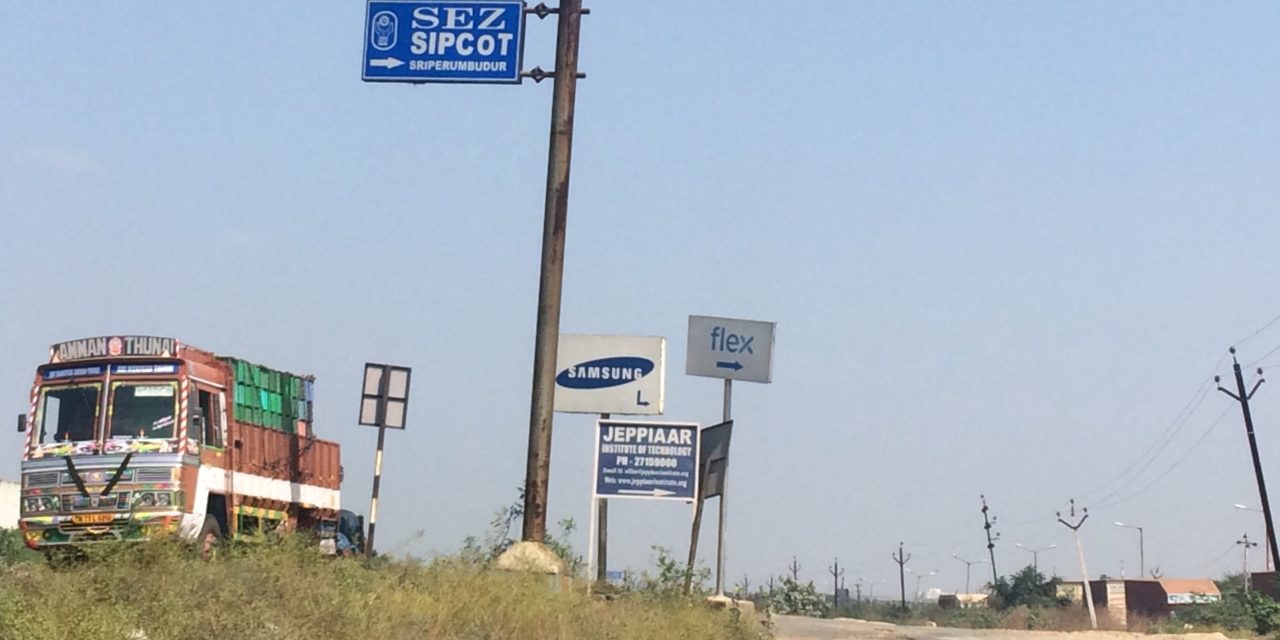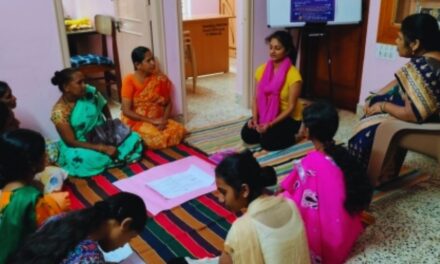While sketching the fast-paced industrialization occurring in and around the villages of Sriperumbudur in Kanchipuram district of Tamil Nadu, we try to see the consequent changes through the eyes of first-generation workers in the area who have entered the industrial labour force with many aspirations.
Our field team recently met with a group of young women from Thirupandhiyur who work at an electronics factory in Sriperumbudur. Thirupandhiyur is a small village in Kancheepuram District of Tamil Nadu, South India.
Sriperumbudur and Sunguvarchatram are industrial hubs located along the busy Chennai-Bangalore Highway. These two towns were well-known religious and agricultural centres in the past. With numerous lakes and tanks, this region had remained largely agrarian and had acres of land under paddy cultivation until a decade ago. Sunguvarchatram was famous for its handicrafts as many households were engaged in hand embroidery.
Big highway but what about village roads?
The region today is in rapid transition from being primarily rural to its new avatar, a bustling industrial zone. Thanks to the availability of vast tracts of land and its proximity to the city of Chennai, the region has grown into a thriving hub for the automobile and electronics manufacturing industries. The swift industrialization of the region has not only irreversibly changed the landscape but also has profoundly impacted the livelihoods of people in the villages around.
Ironically, the villages have remained largely untouched by the infrastructural development created for the industries. Good roads, accessible public transportation, municipal sewage connections, and piped drinking water facilities are still scarce in these villages. Yet, they are witnessing brisk social and economic changes owing to industrialization. Factory employment is replacing agriculture and handicrafts as the primary source of household income. For the youth, freshly out of schools and colleges, the factories offer an opportunity to work in what is widely perceived as “modern” work-places.
Thirupandhiyur is one such village with about 200 households. A narrow road, with cultivable land and mango groves lining it, connects the village to other areas. Despite its proximity to the highway and the sprawling industrial zone, Thirupandhiyur has retained some of the simplicity of a small village. Yet, the village is also a source of labour for the automobile and electronics companies located along the highway. The pool of educated young boys and girls, with great hope for the future, is a fertile recruiting ground for the factories and agents scouting for cheap labour.
Youthful hopes, but disappointing working conditions
Now in their late teens, the workers who met us in Thirupandhiyur began working as operators in an electronics factory immediately after completing their schooling. While some of these workers started very recently, most have been working for close to three years. Though wary of outsiders, the workers did not hesitate to share information about their work and their lives.
What emerged from the brief conversation is very revealing. These young women who began their work lives with high expectations are a disappointed lot after a few years. “I did want to join college and continue my studies but after seeing other girls of my age earning, I decided to work at the factory,” says Revathi,* who started working in the company in 2016 after completing 12th standard. While Revathi still exudes optimism and some impatience to earn, there are others who regret having discontinued their studies to work. “I have over three years of experience in the factory, but my salary is the same as that of a fresher. I would have earned more had I completed a degree or a computer course,” says Geetha* who also began work immediately after finishing 12th standard.
Path to a bright future or stagnant jobs?
Two common issues mentioned by the workers were that their pay scale has not been revised for many years and that they were still on temporary contracts even after working in the same company for years. When asked why they continued despite the low pay, they said that the company is among the few which offer transportation between the factory and their village. Apparently, their parents having concerns about safety would not have allowed them to go to work, had the company not provided transport facilities. The disenchantment was quite palpable when some women announced that they plan to stop working after marriage. Being stuck at the same position and pay scale for a long time, uncertain about better career prospects elsewhere, these young women are not sure if their employment with the company is a blessing or a handicap.
The scale of industrialization witnessed in and around Sriperumbudur and Sunguvarchatram is unprecedented in the region. Having given up their arable land and common resources like grazing land for creating these big industries and amenities, people living in villages like Thirupandhiyur are entitled to decent jobs. Instead, they receive a raw deal of sub-standard jobs that do not take them any closer to a better lifestyle than that of their parents.
*names changed for anonymity





